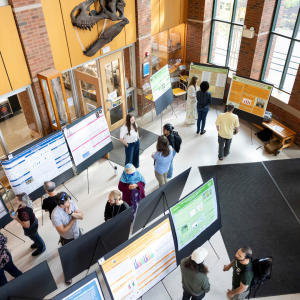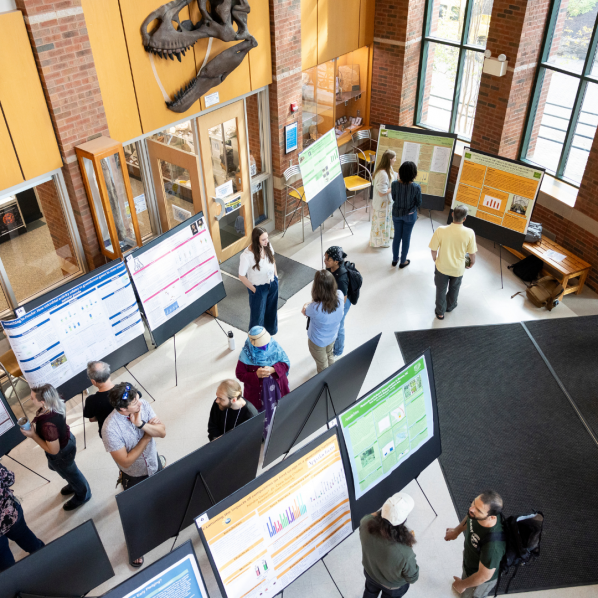BOONE, N.C. — The 2025 Biology Research Day held May 1 in the Rankin Science Building was a golden opportunity for App State student researchers to display their findings and explain the often complex science behind their work. Along with the practice in distilling and presenting their work through 42 posters and six lightning talk sessions, students were able to discover and explore the work of their peers. For seniors, the annual event and competition hosted by the App State Department of Biology was a chance to look back on their undergraduate experiences and ponder how far they have ventured.
“This was an amazing conclusion to a challenging year that saw our building infrastructure devastated by the hurricane and many students, faculty and staff deeply impacted in the aftermath,” said Dr. Ava Udvadia, chair of the Department of Biology. “This incredible showcase of student research was a testament to the resilience of our biology community and a true celebration of science that both strives and thrives even in the face of adversity.”
From differences in carbon storage across Southern Appalachian forests to biocontrol of invasive plants to a dive into the recovery of the Pigeon River following Hurricane Helene, many of the projects were tied to critical local issues and reflected the enterprise and rigor that are signatures of the App State research experience.
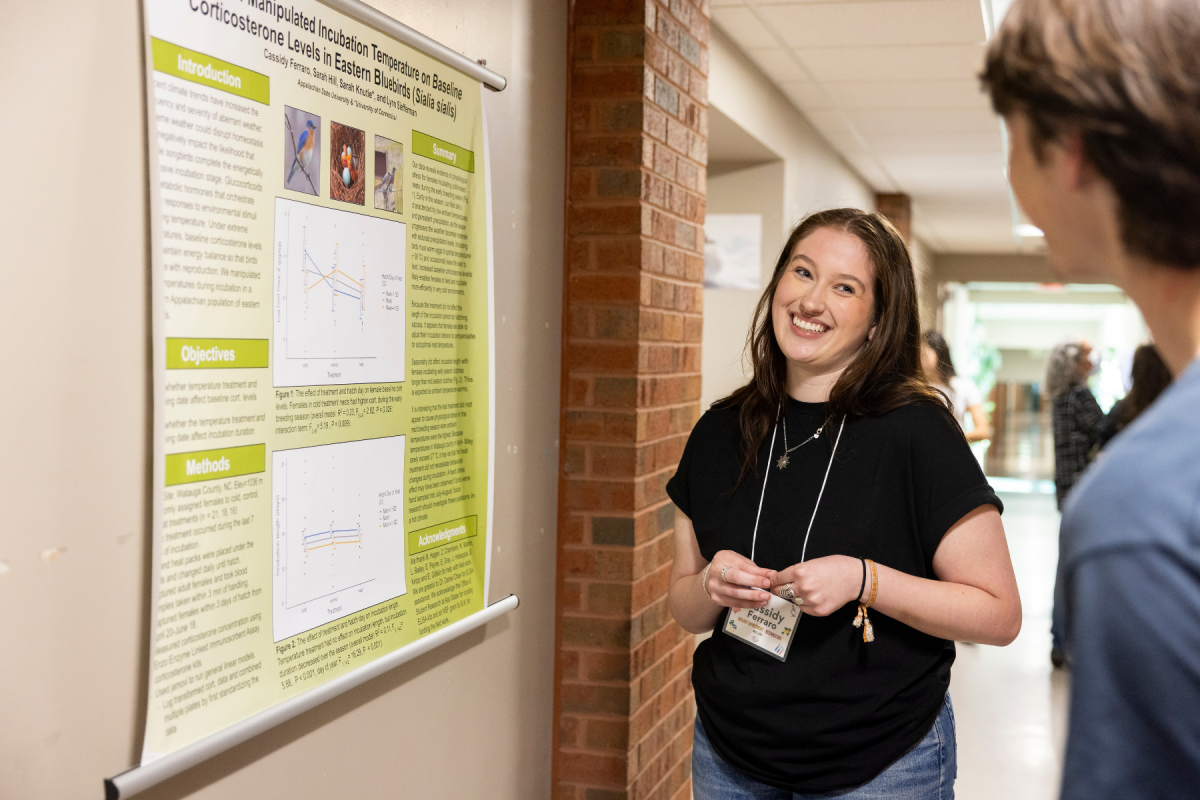
Cassidy Ferraro, a sophomore in biology, discusses her research on the effects of temperature fluctuations on nesting eastern bluebirds. Photo by Kyla Willoughby
Topics of the day encompassed ecology, molecular biology, microbiology, evolution, physiology, environmental shifts and more. For many participants, it was a way to be inspired and to connect.
“You see your peers in the hallways and connect with them socially, but you don’t know exactly what they’re focusing on in the lab. So it’s really cool to see this propagation of knowledge along the entire department,” said senior Andrew Ellis, a biology major from Fayetteville whose research focused on sustainable approaches to shining firmoss, a medicinal clubmoss that is native to Appalachia but faces overharvesting in China.
Evan Curth’s research centered on biocontrol measures to counter the invasive mile-a-minute weed, which has spread into North Carolina and forms mats so dense it chokes out other plants. Curth, a graduate student in biology from Concord, studied the benefits of an introduced weevil which feeds on the vine and helps slow its spread. And moments before her lightning talk session on clues that one species of fruit flies may be splitting into two, biology graduate student Haley Martin rehearsed her themes and was happy to connect with peer researchers from across the spectrum of the department.
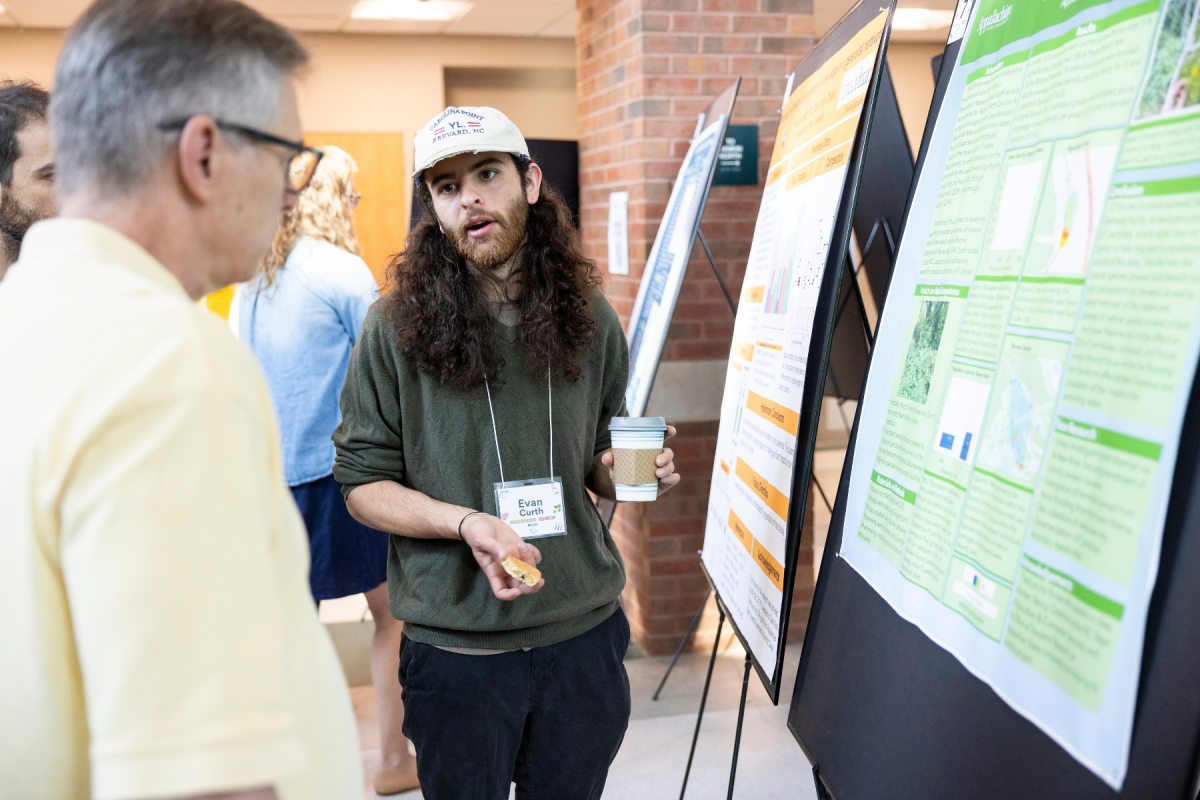
Evan Curth, a graduate student in biology, discusses how introduced weevils work as biocontrol agents against the invasive mile-a-minute weed. Photo by Kyla Willoughby
Keynote speaker Dr. Mary Jane Carmichael ‘12 distinguished herself in research and academia after graduating with a master of science in biology from App State, where she was the co-author of five research papers and earned the Cratis D. Williams School of Graduate Studies Outstanding Thesis Award. A microbial ecologist and biogeochemist who charts microscopic but vital interactions linking worlds above and below ground across ecosystems, Carmichael is an assistant professor of biology and environmental studies at Hollins University. In her address, she shared highlights of field work, lab discoveries, her time at App State and an energizing view of the opportunities in her field. Carmichael is the recipient of the inaugural Department of Biology Distinguished Alumni Award.
"Biology Research Day really was a wonderful celebration of student research that highlighted the good science that is being done at both the undergraduate and graduate levels at Appalachian State," said Carmichael. "It was also a poignant reminder of the importance of basic and applied STEM research to all aspects of our lives and was a hopeful moment that showcased the resilience and ingenuity of the next generation of research scientists."
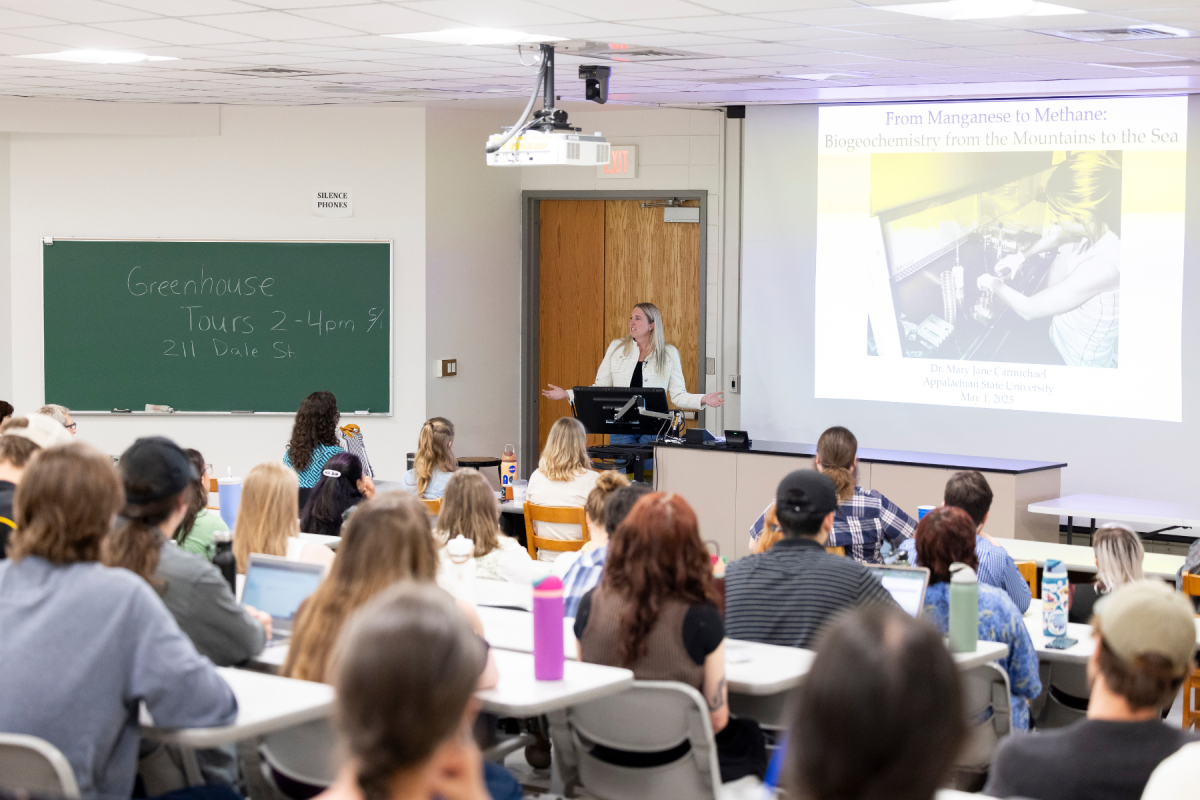
Dr. Mary Jane Carmichael ‘12, the recipient of the inaugural Department of Biology Distinguished Alumni Award, gave the keynote address. Photo by Kyla Willoughby
The day wrapped up with poster presentation awards and a reception. The student research projects grew out of labs, field courses, independent studies and thesis work, often in collaboration with mentors across disciplines and institutions, Udvadia said.
“What unites them is a deep dedication to inquiry, problem-solving, and understanding the living world,” said Udvadia. “None of it would be possible without the incredible mentorship of our faculty—their time, their encouragement and their high expectations. Their dedication to fueling our research enterprise is what gives our students these transformative experiences that literally change the trajectory of their professional lives.”
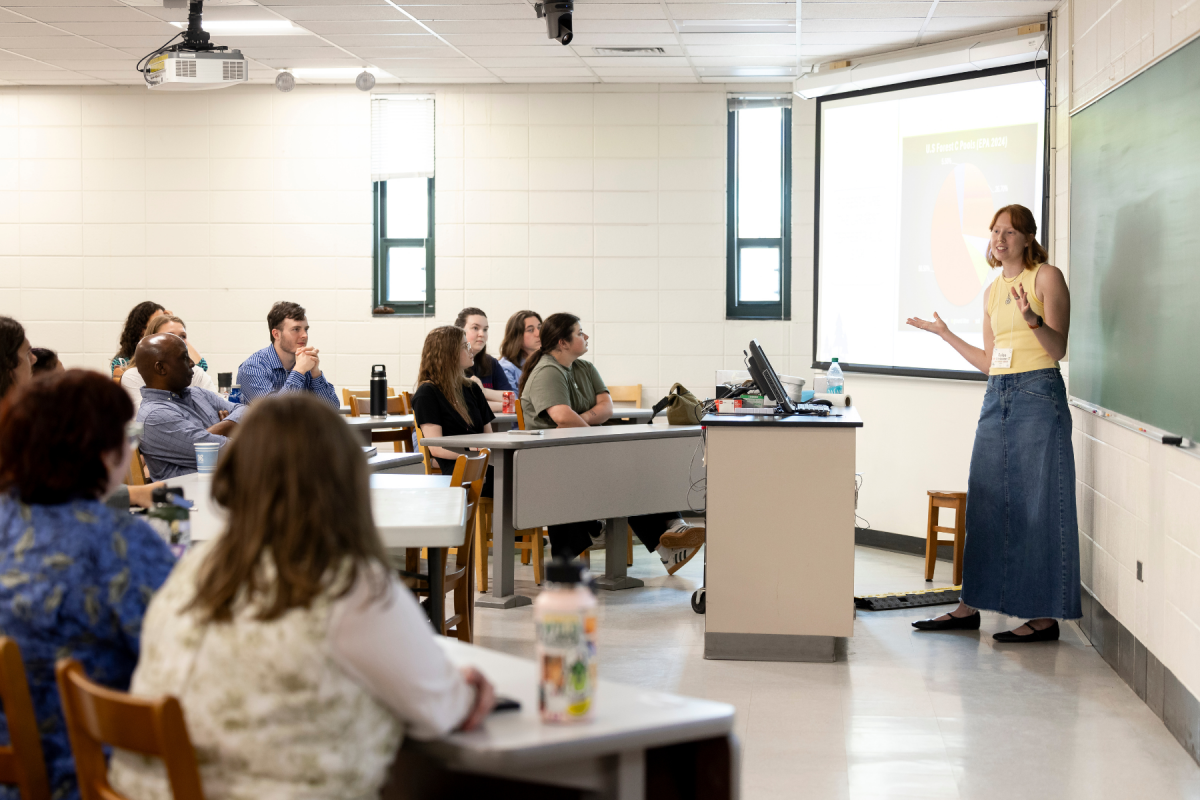
In a lightning talk session at Biology Research Day, graduate student Rylee Strassner explains her carbon storage comparisons between natural successional deciduous forests and planted coniferous forests in the Southern Appalachian Mountains. Photo by Kyla Willoughby
Udvadia acknowledged the work that went into planning the event, writing, “The event itself was a huge undertaking and would not have existed without the dedication of the organizing committee under the capable leadership of Dr. Ashley Adams (committee members included: Dr. Todd Stincic, Kim Paramo, Dr. Jenni Geib and graduate students: Lauren Gray, Maggie Pipkin, Bailey Sauls, Dakota Wagner, and Morgan Gill). Dr. Adams, along with Dr. Cara Fiore, should really be credited with restarting the tradition of research day last year after it died during the Covid years. Last year's event was successful right out of the box and remarkably they managed to make a great event even better this year. Kim Paramo, University Program Specialist, was the behind-the scenes person whose organizational/event planning & promotion skills really made the day. We'd also like to acknowledge the work of Gloria Rhoney — it was not a small feat to get 47 posters printed — and Richard Hodges the muscles behind the set up.”
Student Presentation Awards
First Place Graduate Student Posters (Tie):
- Jenna Hall (Lab: Dr. Mary Kinkel) - "The Role of Gut Motility in Zebrafish"
- Francois Desautels (Lab: Dr. Andy Bellemer) - "An Investigation of the Anticonvulsant Properties of Long Polyunsaturated Fatty Acids for Drosophila melanogaster Seizure Model"
First Place Undergraduate Poster:
- Katherine Baloga (Lab: Dr. Ece Karatan) - "Construction of a ΔnspS Mutant and the Effects on Biofilm Formation in V. coralliliyiticus"
Runner-Up Undergraduate Posters (Tie):
- Addison Pollock (Lab: Dr. Darren Seals) - "The Effect of VSV Infections on Podosome Activity in M1 and M2 THP-1 Macrophages"
- Olivia Carter (Lab: Dr. Ava Udvadia) - "Functional Testing of Enhancer Deletion Mutants Promoting Gene Expression During Optic Nerve Regeneration in Zebrafish"
First Place Lightning Talk:
- Rylee Strassner (Lab: Dr. Ashley Adams) - "Comparing Carbon Storage between Natural Successional Deciduous Forests and Planted Coniferous Forests in the Southern Appalachian Mountains"
People’s Choice Award:
- Grace Alvanos (Lab: Dr. Darren Seals) - "Investigating Elastic Modulus Changes in SRC527-expressing NIH 3T3 Fibroblasts at Different Stages of Invadopodia Formation"
###
About the Department of Biology
The Department of Biology is a community of teacher-scholars, with faculty representing the full breadth of biological specializations — from molecular genetics to landscape/ecosystem ecology. The department seeks to produce graduates with sound scientific knowledge, the skills to create new knowledge, and the excitement and appreciation of scientific discovery. Learn more at biology.appstate.edu.
By Bret Yager
May 7, 2025
BOONE, N.C.
